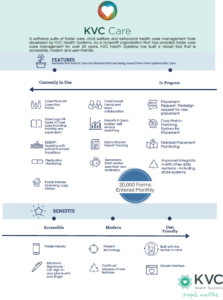Better Foster Care Software? Kansas Nonprofit Is Leading the Charge

Child abuse and neglect, family challenges, the need for foster care and more – these are issues that state governments are used to handling. Through their child welfare systems, state agencies handle complex tasks like case management, matching children with appropriate caregivers, and recording notes from therapy sessions, visitations and other meetings.
But developing technology that is capable of supporting this work has often been a challenge. That’s where KVC Health Systems, a nonprofit based in the greater Kansas City area, saw an opportunity nearly 20 years ago.

Lonnie Johnson, Chief Information Officer
Lonnie Johnson, today the organization’s first Chief Information Officer, began with KVC 18 years ago as a software developer. The state of Kansas was only a few years into its pioneering use of public-private partnerships to deliver child welfare services, and KVC saw that well-built software applications (apps) were a key aspect of providing the highest quality services to children and families.
“Case management is a complex task,” said Johnson. “When a child comes into state custody, there are thousands of pieces of information to keep organized and at workers’ fingertips. We built a case management system that our workers used to enter in data about the child – name, birthdate, medical needs, family background, the child’s photo, their placement history, their case plan goal and more.”
As KVC’s work with the Kansas Department for Children and Families continued and KVC expanded into four more states, the software it built grew with the organization. Today, KVC is about halfway into a multiyear effort to rebuild its legacy system into a modern, mobile-friendly, user-friendly suite of software called KVC Care™.
 Care™ is ahead of the curve in terms of child welfare software. Some of what makes KVC’s technology approach so progressive:
Care™ is ahead of the curve in terms of child welfare software. Some of what makes KVC’s technology approach so progressive:
- Everything in Care is available on a mobile device.
- All child welfare workers have smartphones with hotspots so they can access the Internet from any location, including the home of a family involved in the child welfare system, helping to connect them to resources in their area.
- Electronic case planning, case logs, medication monitoring, family and team collaboration, and reporting
- Medication monitoring system to track and safely reduce the use of psychotropic medication for youth in foster care
- Child/caregiver matching system which matches a child in foster care with the best foster family, plus a new foster home database to support and retain foster families
- Online assessments that can be done in the comfort of people’s home – assessing for trauma or safety risks
- Mobile apps; for example, when a child runs away or goes missing, has an accident or interacts with law enforcement, the worker’s update in the critical incidents app is immediately sent to the state agency and other important partners.
- Workforce apps for things like tracking mileage
- Digital documentation which has replaced paper files, and
- Piloting the use of mental health apps with children receiving therapy
KVC has a combined technology team of about 30 people supporting the organization’s 1,600 staff nationwide. Of those, more than half are dedicated to developing Care and other software integrations. The team uses an agile development methodology, working in short sprints to accomplish goals. As new modules are built in Care, they replace the legacy system. Already, KVC workers submit over 20,000 forms through Care each month, showing the extent to which it is relied on to support child welfare services.

Katie Easley, Vice President of Information Solutions & Team Development
Katie Easley has been with KVC nearly as long as Lonnie Johnson. She leads the software development team, and her husband Brett leads the team that interfaces with third-party electronic health records. This work is much more than a job for the Easleys.
“We have nine children,” stated Katie. “We were foster parents to our first eight children before it became clear, at various times over the years, that they needed to be adopted. First we had two kids, then two more, then a sibling set of four more. Our ninth child was a surprise – we became pregnant after years of thinking that wasn’t in the cards for us. Children are the greatest blessing and we are so thankful for them.”
It’s that passion for family and the desire for every child to feel a sense of belonging that keeps KVC Health Systems moving forward in its journey to develop the very best technology for foster care and other purposes.
“Safety and connection are our two biggest priorities for every person we serve,” said Johnson. “In fact, our child welfare practice model developed by Dr. Suzanne Lohrbach is called Safe & Connected™. We see our software as a way to help that dream come true for every child we serve.”
Right now, Care is used in Kansas and Nebraska and will soon expand to the other states where KVC operates – Missouri, Kentucky and West Virginia. But KVC sees that as just the beginning. “We’ve had 20 years to build, use and enhance our software. No other private organization has a 20-year track record of providing foster care case management services and creating their own software to support it. We want to help many more people, leveraging what we’ve done here in Kansas to strengthen the child welfare systems in other states.”
Learn more about KVC’s technology here.





